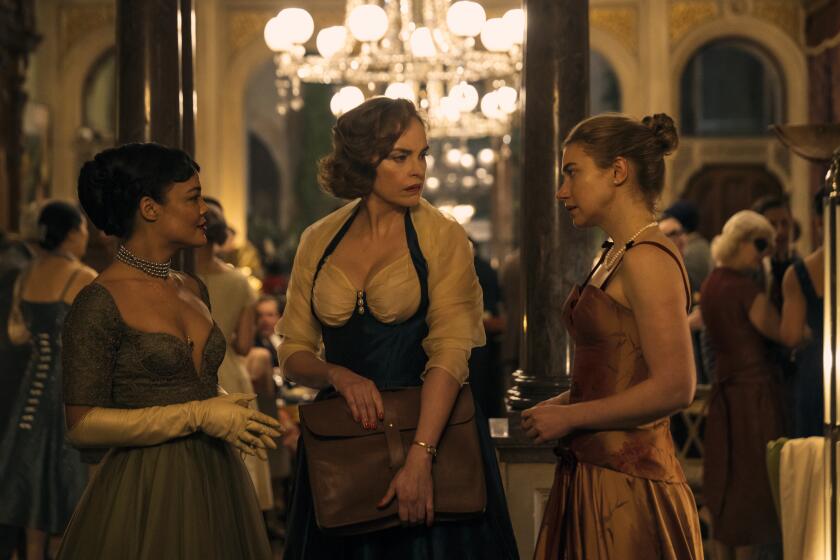
A critic for the Daily Telegraph called the 1891 London debut of “Hedda Gabler” “horrible” and “hideous.” Victorian audiences were shocked by Henrik Ibsen’s portrayal of a beautiful and privileged newlywed who, despite having everything she could want – a luxurious home and a loving husband – was consumed by intense boredom and ultimately met a tragic end.
Nia DaCosta, the director and writer of films like “Candyman” and “The Marvels,” and her lead actress, Tessa Thompson, truly get the complex character of Hedda. Their reimagining of the story is energetic and thrilling, set during a wild, all-night party. While it might not please a traditionalist, DaCosta’s changes actually make Hedda’s anger more powerful. I, for one, think it’s brilliant.
In this production of Hedda Gabler, Thompson portrays Hedda as a spoiled and ambitious woman who was raised to believe her only job was to marry well. With no passions of her own and no desire to be a mother, she spends her time indulging in luxury and subtly trying to boost the career of her rather weak and uninspiring husband, George (played by Tom Bateman). Their marriage is fragile – it feels like her name should be attached to his with just a piece of tape. (His last name, Tesman, is rarely mentioned.) Hedda doesn’t love George; she actually seems to think he’s pathetic. However, she’s determined to help him get a promotion so they can maintain her lavish lifestyle.
Had Hedda been born a man, she likely would have followed in her father, General Gabler’s, footsteps and become a military leader. Instead, she directs her frustration towards those around her. She manipulates people – encouraging the vulnerable to relapse into bad habits or even take desperate actions – seemingly just to cause chaos. Sometimes her actions are planned, but often they stem from resentment towards others who seem to be living more exciting lives. It’s as if she’s deliberately creating destruction for the sake of it, much like the manipulative characters in “Dangerous Liaisons.” Hedda serves as a cautionary tale: stifled women aren’t just a danger to themselves, but a threat to the society that limits them.

Movies
Tessa Thompson, Amanda Seyfried, and Jessie Buckley delivered standout performances in films that were highlights of the Toronto International Film Festival, which featured a particularly strong lineup this year.
Taking inspiration from her complex main character, director Polly DaCosta reimagines Ibsen’s play to fit her vision. She sets the story in 1950s England, a time when societal expectations largely confined women to the home – a situation reminiscent of the original play. (It would be fascinating to see this story adapted within a community of modern “tradwives”!) DaCosta has also streamlined the plot, notably removing a scene that took place at a bachelor party Hedda wasn’t allowed to attend. In Ibsen’s version, Hedda bitterly complains about being excluded while the men enjoy themselves, lamenting, “What a pity the fair lady can’t be there, invisible.”
In this adaptation, the story takes place at a wild party Hedda throws at her mansion. She’s hoping to impress Professor Greenwood, a potential employer for her husband George, who she’s heard is unconventional. Hedda is completely in control, orchestrating the evening and even convincing the guests to playfully push her former classmate, the rather naive Thea, into the lake. The party atmosphere is enhanced by a dance band playing a lively cover of Björk’s future hit, “It’s Oh So Quiet.” The song’s energetic build-ups and dramatic lyrics perfectly reflect Hedda’s increasingly frantic and volatile emotions.
From the very first scene, I knew this night was going to be a disaster. We meet Hedda as she’s being questioned by two police officers, and you can just feel her frustration as she asks, “Where should I start?” The way the film then flashes back to show us what happened, it’s like watching a suspenseful game unfold. There’s this shot of Hedda looking down at a room full of people, and it instantly made me think of the board game Clue – like everyone is a suspect and danger is lurking everywhere. Seriously, every object feels like a potential weapon – those pistols in the leather box, that wobbly chandelier, even the dark water of the lake outside. It sets such a tense, unsettling mood, and I was immediately hooked trying to figure out which threat would surface first.
I’ve been a fan of Thompson for years – I actually first saw her as Juliet in a tiny theater in Pasadena when she was just starting out, and even then, she was incredible! It’s so great to see her blossoming into a star in bigger projects like “Thor” and “Creed”, but she’s always been a seriously talented actress, capable of handling anything. Even something as small as how she eats a cherry feels powerful – she just commands attention. It’s a wonderful reminder of her roots and how much range she truly has. She’s a fantastic performer, period.
She confidently adopts a beautiful facade – striking red lips, prominent cheekbones, and a cool attitude – but occasionally lets it falter. The editor, Jacob Schulsinger, frequently gives her a brief moment to pause before she acts destructively, hinting at a flicker of conscience. She confesses to Judge Brack, a busybody, that she sometimes acts impulsively, revealing a rare vulnerability. It’s almost as if she’s seeking assistance. Unfortunately, the judge is only interested in seducing her, which is incredibly tiresome.

Movies
The 27 best movie theaters in Los Angeles
We’ve created a guide to 27 fantastic movie theaters in Los Angeles, including iconic spots like the TCL Chinese and New Beverly, popular chains like Alamo Drafthouse, and the best AMC location in Burbank.
DaCosta skillfully weaves themes of race and sexuality into the classic story. She reimagines Hedda’s former lover, Eilert, as Eileen (played with confidence by Nina Hoss), a lesbian and talented author who challenges expectations and competes with George for a job – and is the only person Hedda genuinely connects with. This version of Hedda faces even greater risks than previous ones, simply because she is Black and queer, and the script doesn’t need to explicitly state this danger. The tension is subtly conveyed, for example, when a guest casually remarks that Hedda is darker-skinned than they expected. Hedda ignores the comment, refusing to show weakness, and immediately retaliates by dominating the conversation and subtly undermining the speaker.
Is it better to be like Eileen, who bravely confronts others and insists on being herself, or Hedda, who manipulates events from the shadows? They’re destined to clash and hurt each other, and while it’s entertaining to watch Hedda cause chaos, it’s painful to see these two strong women drive each other to emotional breakdowns – as doctors might have called it back then.
Looking at these characters today, it’s easy to understand why they’re both angry, and it’s possible they both struggle with mental health. While the playwright doesn’t offer a clear judgment, the production immerses us in Hedda’s thoughts, letting us experience exactly what triggers her. Insults feel like sharp attacks, and new ideas fill her with restless energy, perfectly matched by the powerful, driving music.
Costume designer Lindsay Pugh brilliantly portrays the film’s female characters through their clothing. Hedda’s outfit includes tight strands of pearls and a green dress that reflects her envy. When her competitor, Thea, arrives in simpler clothes, Hedda cruelly makes her wear an unflattering dress. Despite being humiliated and visibly upset, Thea hopes her good character will reveal Hedda’s inner flaws.
What truly sets Pugh’s performance apart is the choice to dress Eileen in a strikingly feminine dress that emphasizes her figure, portraying her as a powerful, almost mythical woman. This embodies the film’s core theme of female strength. When Eileen confidently enters a room full of male coworkers, the dress immediately reveals how quickly admiration can turn to mockery, and how little margin for mistake she – or any woman – is given.
Read More
- Clash Royale Best Boss Bandit Champion decks
- Vampire’s Fall 2 redeem codes and how to use them (June 2025)
- Mobile Legends January 2026 Leaks: Upcoming new skins, heroes, events and more
- World Eternal Online promo codes and how to use them (September 2025)
- How to find the Roaming Oak Tree in Heartopia
- Best Arena 9 Decks in Clast Royale
- Clash Royale Furnace Evolution best decks guide
- ATHENA: Blood Twins Hero Tier List
- Clash Royale Season 79 “Fire and Ice” January 2026 Update and Balance Changes
- Brawl Stars December 2025 Brawl Talk: Two New Brawlers, Buffie, Vault, New Skins, Game Modes, and more
2025-10-22 22:01